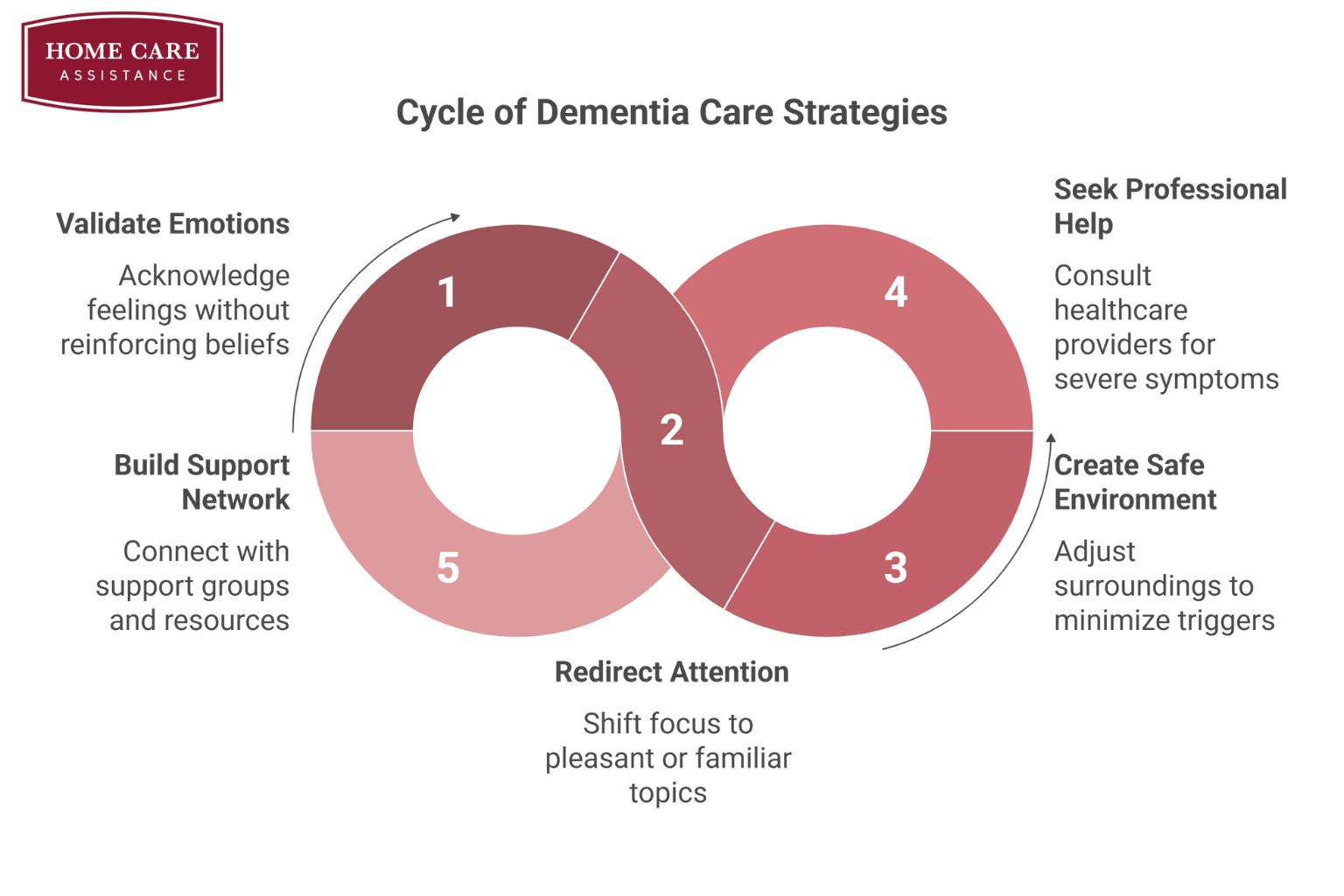Hallucinations and false beliefs are common symptoms of dementia that can be distressing for both seniors and caregivers. Learning effective response strategies helps you create a calmer environment while maintaining your aging loved one’s dignity and emotional wellbeing.
Validate Your Loved One’s Emotions without Reinforcing the Belief
When your loved one experiences hallucinations or expresses false beliefs, focus on acknowledging the feelings rather than correcting the perception. This approach reduces anxiety while avoiding arguments that can escalate the situation.
Effective validation techniques include:
- Saying “That sounds frightening” instead of “There’s nothing there”
- Acknowledging your loved one’s concern with phrases like “I can see you’re worried about this”
- Asking gentle questions about how your loved one is feeling rather than what he or she is seeing
- Offering comfort through your tone and body language
- Avoiding phrases that dismiss your loved one’s experience, such as “You’re imagining things”
Remember that your loved one’s emotional response to the hallucination is real, even if the perception itself isn’t based in reality. By validating your loved one’s feelings, you build trust and create opportunities for redirection without causing additional distress.
Use Gentle Redirection Techniques
Redirecting attention away from hallucinations or false beliefs often works better than direct confrontation. This strategy helps you shift focus toward more pleasant or familiar topics while allowing the disturbing thoughts to fade naturally.
Successful redirection methods include:
- Engaging your loved one in a favorite activity like looking through photo albums
- Suggesting a snack or beverage your loved one enjoys
- Playing familiar music from your loved one’s past
- Moving to a different room or environment
- Initiating conversation about positive memories or family members
The key to effective redirection is timing and patience. If the first attempt doesn’t work, wait a few moments and try a different approach. Sometimes simply changing the physical environment can break the cycle of disturbing thoughts.
Create a Calm and Safe Environment
Environmental factors can trigger or worsen hallucinations and false beliefs in dementia patients. Making adjustments to your loved one’s surroundings can reduce these episodes while promoting overall comfort and security.
Consider these environmental modifications:
- Ensure adequate lighting throughout the day to minimize shadows and visual confusion.
- Remove or cover mirrors that might cause identity confusion.
- Minimize background noise from televisions or radios that could be misinterpreted.
- Keep familiar objects and photographs visible to provide grounding references.
- Maintain consistent daily routines that create predictability and security.
Pay attention to patterns when hallucinations occur. Sundowning, fatigue, or specific locations might trigger these episodes. Identifying these patterns helps you make proactive environmental changes that prevent or reduce symptoms.
One of the most challenging tasks of helping an elderly relative age in place safely and comfortably is researching agencies that provide homecare. Turn to Home Care Assistance for reliable, high-quality in-home care for aging adults. We offer 24-hour live-in care for seniors who require extensive assistance, and we also offer respite care for family caregivers who need a break from their caregiving duties.
Know When to Seek Professional Help
While some hallucinations and false beliefs are manageable at home, certain situations require medical intervention. Understanding when to contact healthcare providers ensures your loved one receives appropriate treatment for more severe symptoms.
Contact the doctor when:
- Hallucinations become frequent or increasingly distressing
- False beliefs lead to aggressive or dangerous behaviors
- Sleep patterns are severely disrupted by these symptoms
- Your loved one becomes withdrawn or stops eating due to these experiences
- Symptoms suddenly worsen or change in character
Healthcare providers can evaluate whether medication adjustments might help or if underlying medical conditions are contributing to the symptoms. They can also provide additional resources and strategies specific to your loved one’s needs.
Caring for senior loved ones can be challenging for families who don’t have expertise or professional training in home care, but this challenge doesn’t have to be faced alone. Family caregivers can turn to Anchorage Home Care Assistance for the help they need. We provide high-quality live-in and respite care as well as comprehensive Alzheimer’s, dementia, stroke, and Parkinson’s care.
Build Your Support Network
Managing hallucinations and false beliefs can be emotionally challenging for caregivers. Having reliable support helps you maintain patience and perspective while caring for someone experiencing these difficult symptoms.
Strengthen your support system by:
- Connecting with local dementia caregiver support groups for practical advice
- Reaching out to family members who can provide occasional respite care
- Consulting with healthcare professionals about specific challenges you’re facing
- Joining online communities where you can share experiences with other caregivers
- Taking advantage of community resources like adult day programs
Remember that seeking support isn’t a sign of weakness. It’s an essential part of providing quality care. Other caregivers who have faced similar challenges can offer valuable insights and emotional encouragement during difficult times.
Caring for seniors with dementia can be challenging for family caregivers. Luckily, there is dementia care Anchorage families can rely on. Professional dementia caregivers help seniors with dementia stay safe and comfortable at home by preventing wandering, providing cognitive stimulation, and assisting with household chores. Trust your loved one’s care to the professionals at Home Care Assistance. To create a customized home care plan for your loved one, call (907) 770-0907 today.

